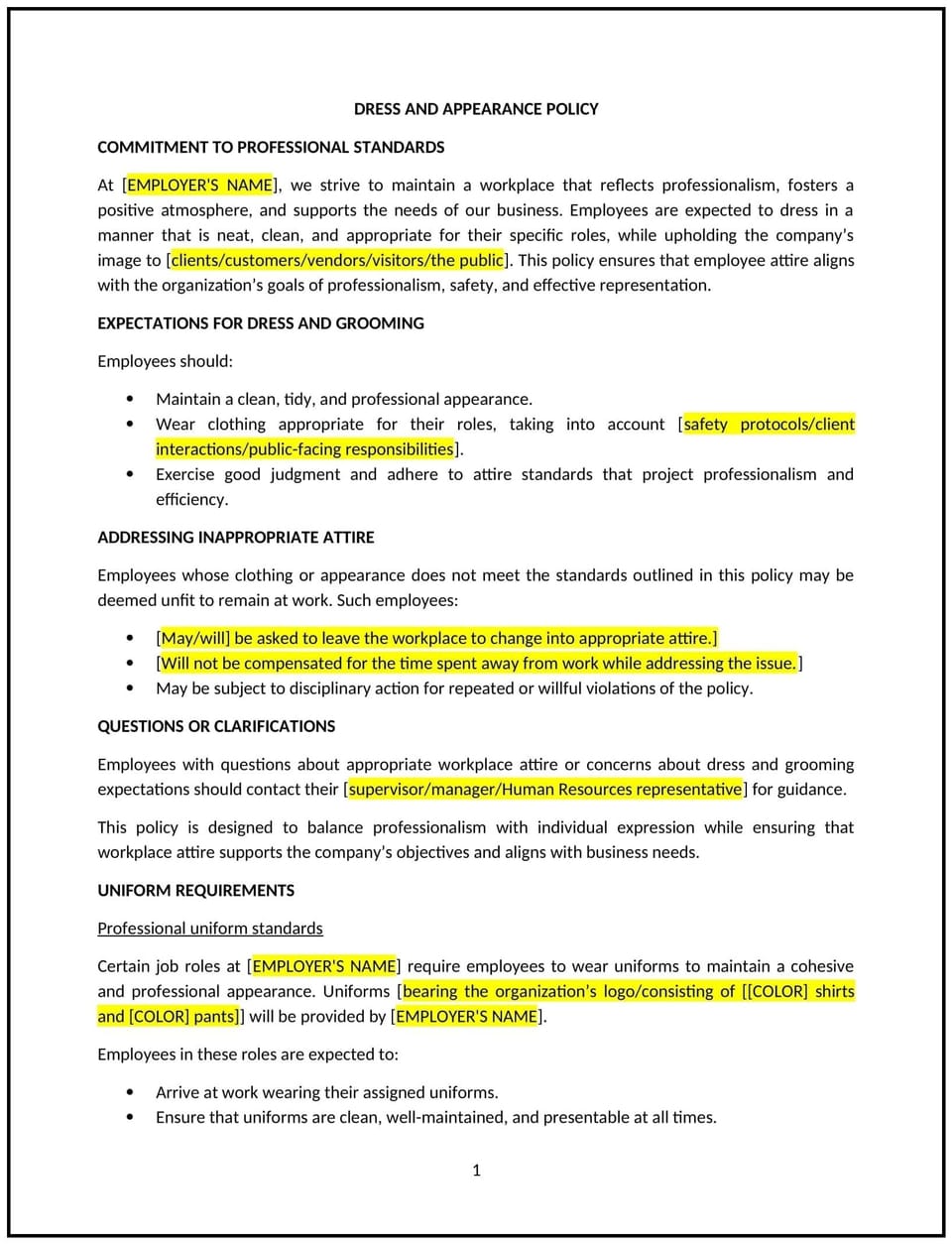Dress and appearance policy (Louisiana): Free template

Dress and appearance policy (Louisiana)
This dress and appearance policy is designed to help Louisiana businesses set clear expectations for employee attire and grooming. It provides guidelines that align with the company’s image, industry standards, and safety requirements while allowing for flexibility and inclusivity.
By implementing this policy, businesses can maintain professionalism, promote a positive workplace image, and ensure comfort and safety for employees.
How to use this dress and appearance policy (Louisiana)
- Define dress code categories: Specify different dress standards for various roles or occasions, such as business casual, formal, or uniforms.
- Address safety requirements: Include specific attire or grooming practices required for safety, such as protective gear or closed-toe shoes.
- Encourage inclusivity: Allow reasonable accommodations for cultural, religious, or medical needs related to dress and appearance.
- Clarify expectations: Clearly outline what constitutes appropriate and inappropriate attire or grooming for the workplace.
- Establish review processes: Provide a way for employees to seek clarification or request exceptions to the policy.
- Communicate consequences: Specify steps for addressing non-compliance, including warnings or corrective actions.
Benefits of using a dress and appearance policy (Louisiana)
Implementing this policy provides several advantages for Louisiana businesses:
- Promotes professionalism: Maintains a positive and consistent company image.
- Supports safety: Reduces workplace hazards by requiring appropriate attire in specific roles.
- Encourages inclusivity: Accommodates diverse employee needs while balancing workplace expectations.
- Clarifies expectations: Minimizes misunderstandings about dress and appearance standards.
- Reflects Louisiana-specific considerations: Aligns with regional business norms and cultural practices.
Tips for using this dress and appearance policy (Louisiana)
- Be clear and specific: Provide detailed examples of acceptable and unacceptable attire to avoid ambiguity.
- Train managers: Equip supervisors with tools to address dress code concerns respectfully and consistently.
- Allow flexibility: Incorporate casual dress days or options for remote work attire to improve employee comfort.
- Include seasonal considerations: Adapt dress code requirements for Louisiana’s weather and climate conditions.
- Review regularly: Update the policy to reflect changes in business needs or workplace culture.
Q: What is considered appropriate attire under this policy?
A: Appropriate attire depends on the workplace environment but typically includes business casual or professional clothing, as outlined in the policy.
Q: Can businesses require uniforms?
A: Yes, businesses can require uniforms for specific roles or departments to maintain consistency and professionalism.
Q: How should businesses handle requests for dress code accommodations?
A: Businesses should consider requests on a case-by-case basis and provide reasonable accommodations for cultural, religious, or medical needs.
Q: Are casual dress days allowed under this policy?
A: Casual dress days may be permitted, depending on the company’s guidelines and the nature of the work being performed.
Q: What steps should businesses take if an employee violates the dress code?
A: Managers should address violations respectfully, provide guidance on appropriate attire, and take corrective action if necessary.
Q: How often should this policy be reviewed?
A: The policy should be reviewed annually or when changes in workplace culture or industry standards occur.
Q: How can businesses balance professionalism with employee comfort?
A: Businesses can offer options such as flexible dress codes, climate-appropriate attire, and casual dress days while maintaining professional standards.
This article contains general legal information and does not contain legal advice. Cobrief is not a law firm or a substitute for an attorney or law firm. The law is complex and changes often. For legal advice, please ask a lawyer.


